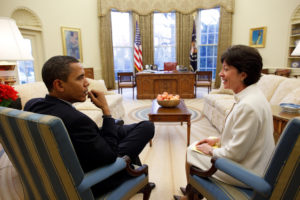
President Barack Obama meets with Sen. Susan Collins (R-Maine) in the Oval Office, Feb. 4, 2009. Collins was one of three Republican Senators who voted for the stimulus bill. (Official White House Photo by Pete Souza)
Is it bribery or extortion?
As though the undignified theatrics that took place during last week’s confirmation hearings of Brett Kavanaugh weren’t embarrassing enough, there is now this, according to the WSJ. Unless Senator Susan Collins (R. ME) opposes Judge Kavanaugh’s confirmation, a crowdfunding website pledges to give more than $1 million to her opponent in 2020.
Donors are asked to make a financial pledge and then enter their credit-card information. As of Tuesday afternoon, 37,425 people had put down $1,041,878.
The fine print makes clear the quid pro quo: “Your card will only be charged if Senator Susan Collins votes for Kavanaugh’s confirmation to the Supreme Court.” To avoid the money bomb, all Ms. Collins must do is vote “no.”
It isn’t clear this is even legal. We’re all for citizens exercising their free-speech rights, including campaign donations, for or against political candidates. But federal law defines the crime of bribery as “corruptly” offering “anything of value” to a public official, including a Member of Congress, with the intent to “influence any official act.” The crowdfunders in this case are offering something of value—withholding funds from her opponent—in return for a Supreme Court confirmation vote.
Another pressure tactic, one Ms. Collins says she finds “incredibly offensive,” is “the out-of-state voicemails being left on the answering machines of my state offices.” Many of the messages are profane. “In one case—and we are going to turn this over to the police, but unfortunately, of course, the person didn’t leave a name or number—but they actually threatened to rape one of my young female staffers.”
Even diehard opponents of Judge Kavanaugh must recognize the unseemly nature of this bid to intimidate a U.S. Senator.
Senator Collins’ response to this attempt to buy her vote: “I’m going to do what I think is right. I am going to cast my vote—as I have done on all of the other Supreme Court nominees that I’ve been called upon to consider—based on his qualifications, his character and integrity, judicial temperament, his record, and his respect for the rule of law and fidelity to the Constitution.”
If you’re willing to fight for Main Street America, click here to sign up for the Richardcyoung.com free weekly email.





